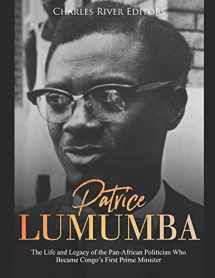
Patrice Lumumba: The Life and Legacy of the Pan-African Politician Who Became Congo’s First Prime Minister
Book details
Summary
Description
*Includes pictures
*Includes online resources and a bibliography for further reading
"Without dignity there is no liberty, without justice there is no dignity, and without independence there are no free men." - Patrice Lumumba
The modern history of Africa was, until very recently, written on behalf of the indigenous races by the white man, who had forcefully entered the continent during a particularly hubristic and dynamic phase of European history. In 1884, Prince Otto von Bismarck, the German chancellor, brought the plenipotentiaries of all major powers of Europe together, to deal with Africa's colonization in such a manner as to avoid provocation of war. This event-known as the Berlin Conference of 1884-1885-galvanized a phenomenon that came to be known as the Scramble for Africa. The conference established two fundamental rules for European seizure of Africa. The first of these was that no recognition of annexation would granted without evidence of a practical occupation, and the second, that a practical occupation would be deemed unlawful without a formal appeal for protection made on behalf of a territory by its leader, a plea that must be committed to paper in the form of a legal treaty.
One of the most controversial colonization efforts took place in the Congo, which still conjures up contrasting images of jungles, wildlife, warlords, civil wars, blood diamonds, and the ongoing anarchy of ethnic and tribal warfare. Indeed, the vast expanse of Congo remains one of the most enigmatic and little-known regions of Africa. It is also, undeniably, the original African failed state. It has suffered generations of warlord rule, inter-ethnic violence and insecurity, particularly in the remote and isolated east of the country.
The original name of the region derives from the Kingdom of Kongo, a pre-colonial power that ruled a limited region surrounding, and extended south of, the mouth of the Congo River. The first Europeans to discover the mouth of the Congo River were the Portuguese, who incrementally explored the coast of Africa throughout the late 15th century and established diplomatic and trade relations with the Kongo Kingdom before assuming control of what later became Portuguese West Africa, and later still Angola. At that point in history, the European trading powers were only really interested in trade, most particularly the Atlantic Slave Trade, and there was little incentive to penetrate the interior to any depth. The Portuguese made no particular effort, therefore, to explore the Congo River any further inland than the Crystal Mountains or the extensive region of rapids that tended to shield the interior from the coast. For generations the Portuguese simply traded off the coast, while what lay beyond in the dark interior remained a matter of myth and speculation.
It was in the nature of Belgium's withdrawal from Africa that power was essentially handed over to the first in line to receive it. Very little of the careful preparation that characterized the British withdrawal from Africa was evident in Congo, in major part due to the fact that the Belgian system of administration allowed for no phased entry of Congolese employees into the executive level, so there was no one trained or experienced in running a government who was in a position to take over from the departing Belgians. The same, indeed, was true in the armed forces.
As it turned out, the first in line to take power was a tall, stern-featured ideologue by the name of Patrice Lumumba. Though he was still just 35, his life story was already one full of ideology, politics, and chaos, and things would only get more turbulent once he became the Congo's leader.
Patrice Lumumba: The Life and Legacy of the Pan-African Politician Who Became Congo's First Prime Minister looks at one of the most important African leaders of the 20th century.


We would LOVE it if you could help us and other readers by reviewing the book
Book review



